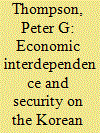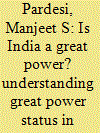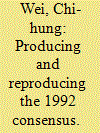| Srl | Item |
| 1 |
ID:
137400


|
|
|
|
|
| Summary/Abstract |
A basic trade-off in military cooperation exists: States must respond to the dominant ally’s demands and act as a reliable partner while simultaneously making a decision that is acceptable to domestic audiences. We argue that compensatory burden-sharing strategies are imperfect but dependable solutions to manage foreign policy decisions at the domestic and alliance levels. Our theoretical expectations are tested using the US-Japan and US-Republic of Korea alliances and, in particular, the contribution of each country to the war in Afghanistan. We find that foreign aid commitments to third parties are made as a form of compensation when alliance expectations are substantial, but the secondary ally's ability to contribute militarily is highly constrained. Foreign aid has therefore served as an alliance management tool.
|
|
|
|
|
|
|
|
|
|
|
|
|
|
|
|
| 2 |
ID:
137401


|
|
|
|
|
| Summary/Abstract |
Given North Korea’s desire to maintain nuclear weapons—and barring its unexpected collapse—how can the US and its allies establish and maintain a peaceful Northeast Asia? Current US policy alternatives do not offer an effective means for removing North Korean nuclear weapons without creating many more serious problems that jeopardize a stable future for Northeast Asia. However, by engaging in foreign direct investment (FDI) through North Korea’s special economic zones, the United States and other nations can engage North Koreans at all levels of society and build a future environment of cooperation and stability. Such a long-term engagement policy will prove more successful than isolation, sanctions, or military force, and will bolster regional actors’ efforts to develop additional stability-inducing policies.
|
|
|
|
|
|
|
|
|
|
|
|
|
|
|
|
| 3 |
ID:
137399


|
|
|
|
|
| Summary/Abstract |
The traditional approaches to great power status - the intuitive criteria, an emphasis on warfare, and system-/global-level capabilities - have serious limitations. These approaches have ignored the implications of the expansion of the European states-system into a global one along with the simultaneous regionalization of world politics. Therefore, a threefold criterion for great power status is proposed - the presence of security-related and economic interests outside of a state's home region, the requisite capabilities, and the demand for this status and its acceptance by other great powers and the regional states. India has emerged as a great power because it meets these criteria in Southeast Asia. India's transformation from a South Asian power into one capable of shaping the regional order in Asia is of theoretical significance.
|
|
|
|
|
|
|
|
|
|
|
|
|
|
|
|
| 4 |
ID:
137402


|
|
|
|
|
| Summary/Abstract |
In the study of China-Taiwan relations, scholars view the so-called “1992 consensus” as essential to economic ties across the Taiwan Strait. However, such an argument overlooks the fact that the 1992 consensus was initially coined as a political formula concerning what “one China” meant. It was not until after 2008 that an economic logic was attached in a sociolinguistic way to the 1992 consensus by proponents of the 1992 consensus. Specifically, “1992ers” argued that China might sever cross-Strait economic ties should Taiwan reject the 1992 consensus. I thus argue that scholarly understandings about cross-Strait politics and/or economics are not unaffected by 1992ers’ interpretations. When 1992ers (re)interpret the 1992 consensus in economic terms, their discursive practices may change the intersubjective understandings about the cross-Strait political economy.
|
|
|
|
|
|
|
|
|
|
|
|
|
|
|
|